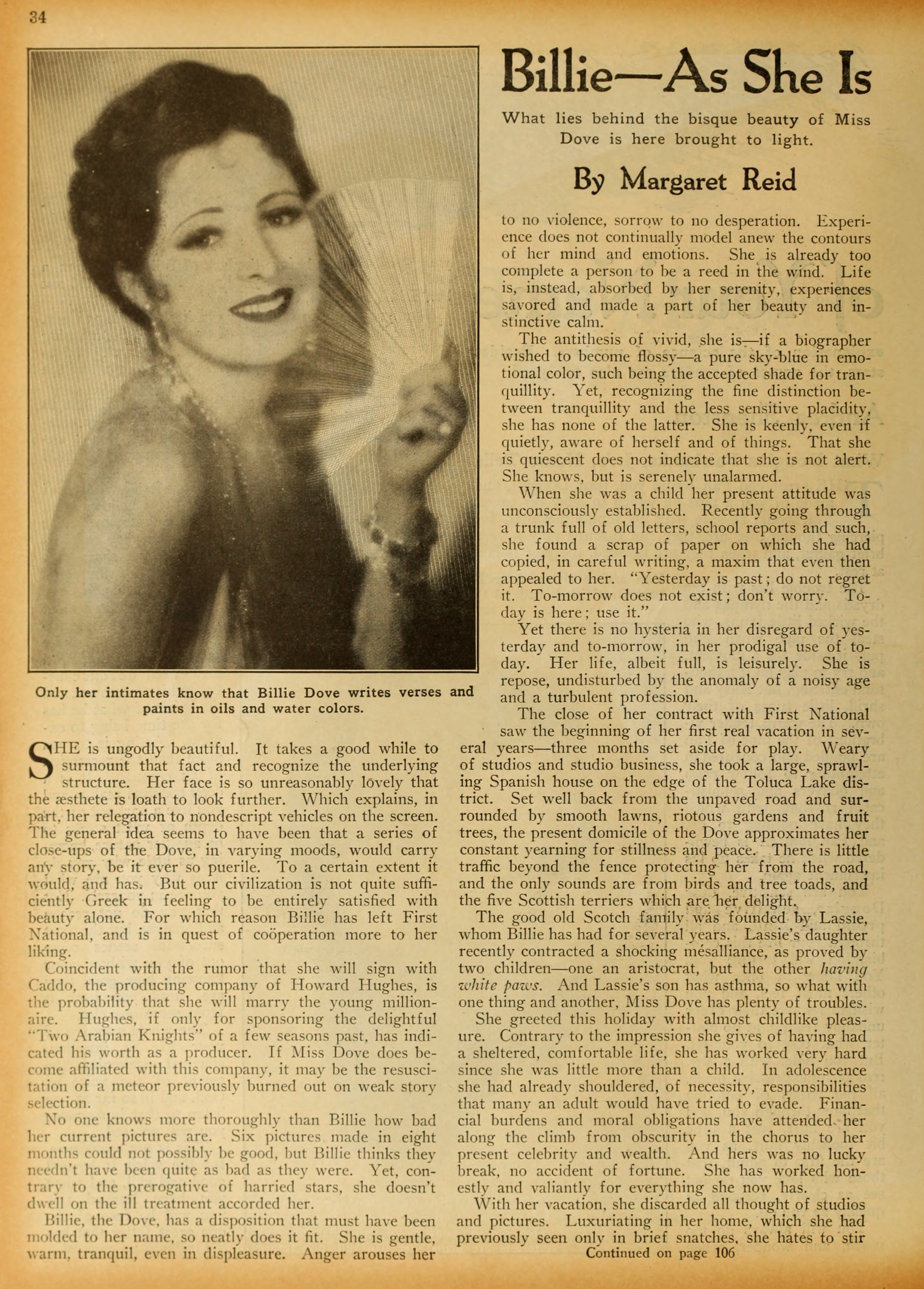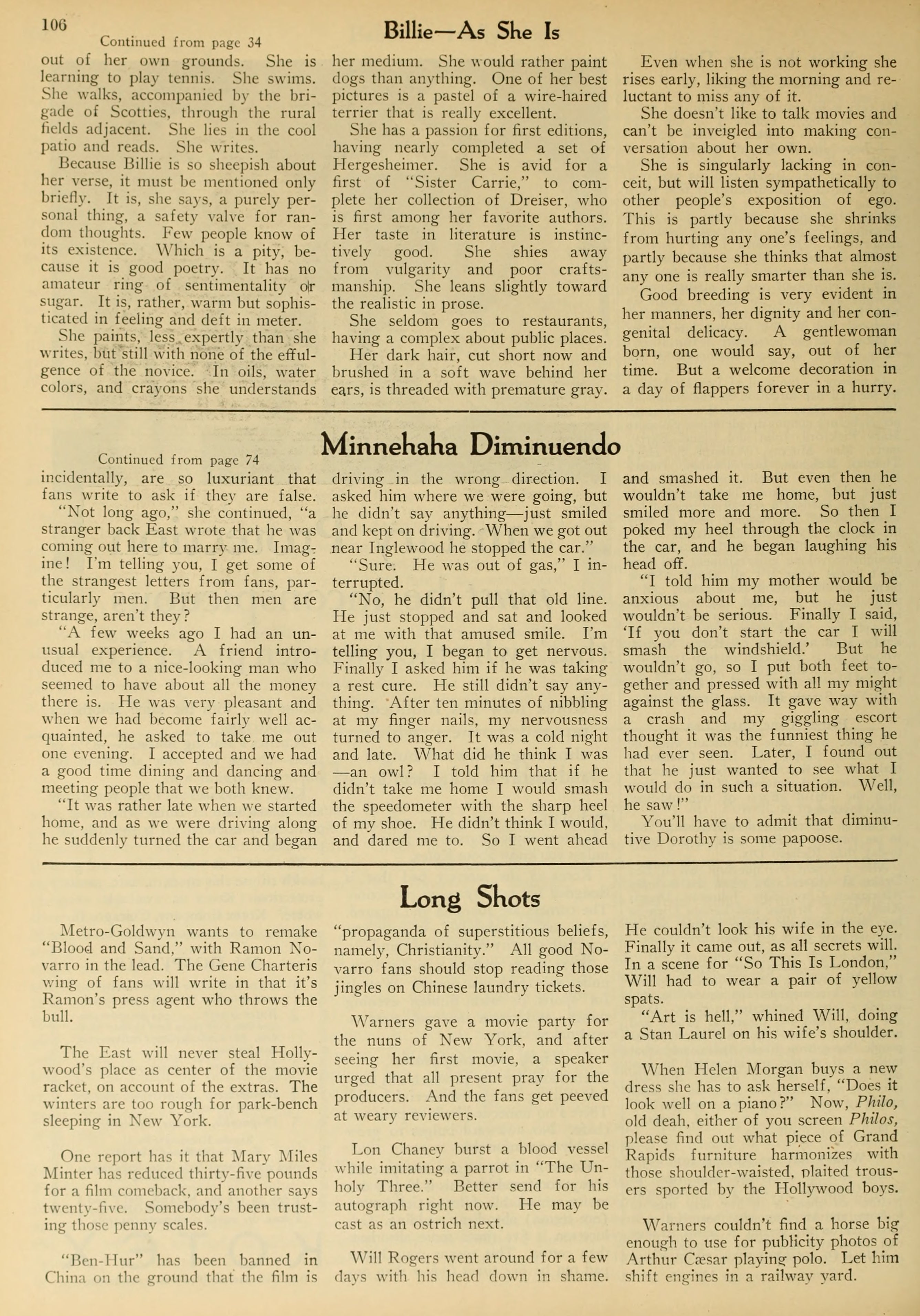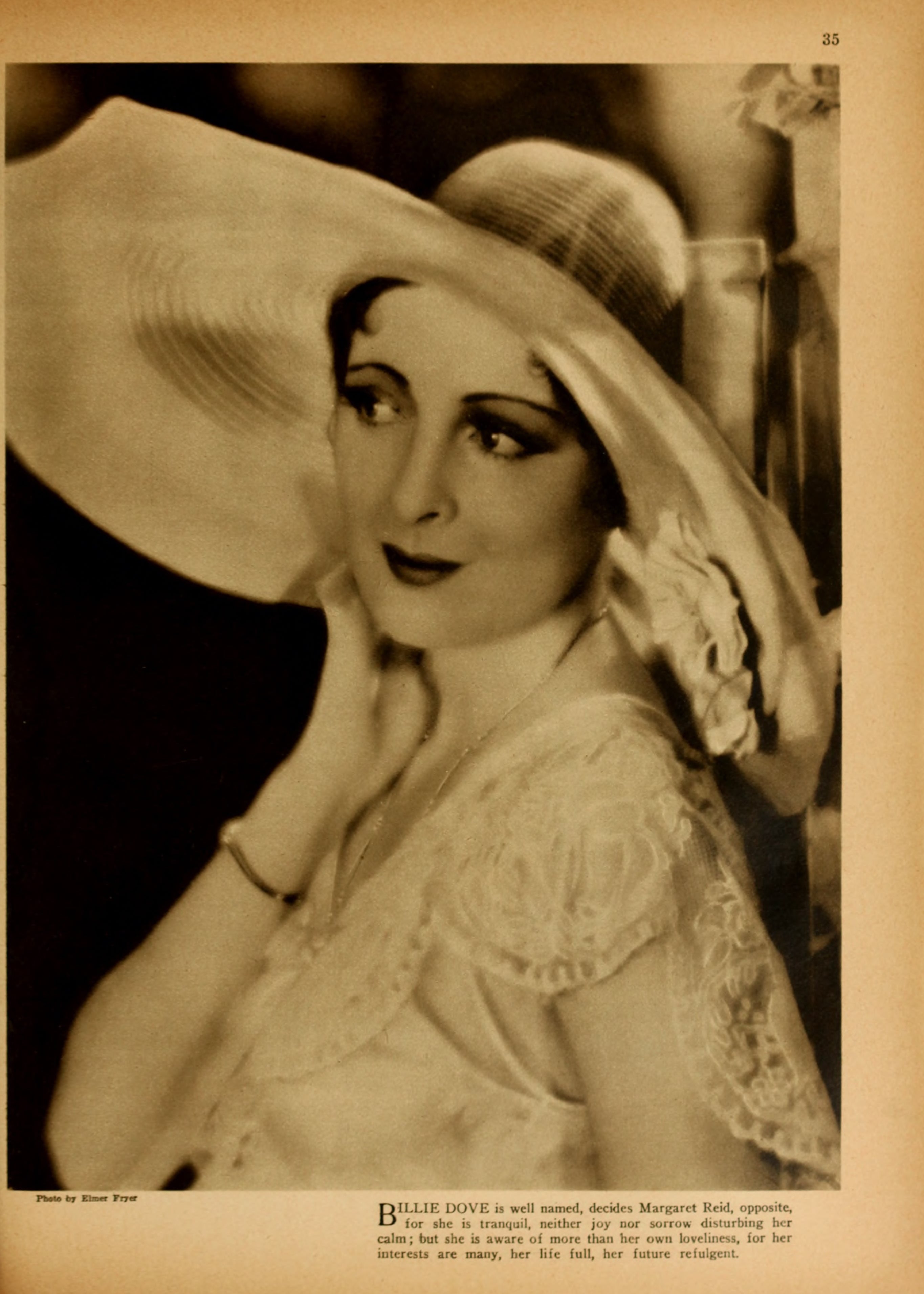Billie Dove — As She Is (1930) 🇺🇸

She is ungodly beautiful. It takes a good while to surmount that fact and recognize the underlying structure. Her face is so unreasonably lovely that the aesthete is loath to look further.
by Margaret Reid
Which explains, in part, her relegation to nondescript vehicles on the screen. The general idea seems to have been that a series of close-ups of the Dove, in varying moods, would carry any story, be it ever so puerile. To a certain extent it would, and has. But our civilization is not quite sufficiently Greek in feeling to be entirely satisfied with beauty alone. For which reason Billie has left First National, and is in quest of cooperation more to her liking.
Coincident with the rumor that she will sign with Caddo, the producing company of Howard Hughes, is the probability that she will marry the young millionaire. Hughes, if only for sponsoring the delightful “Two Arabian Knights” of a few seasons past, has indicated his worth as a producer. If Miss Dove does become affiliated with this company, it may be the resuscitation of a meteor previously burned out on weak story selection.
No one knows more thoroughly than Billie how bad her current pictures are. Six pictures made in eight months could not possibly he good, but Billie thinks they needn’t have been quite as bad as they were. Yet, contrary to the prerogative of harried stars, she doesn’t dwell on the ill treatment accorded her.
Billie, the Dove, has a disposition that must have been molded to her name, so neatly does it fit. She is gentle, warm, tranquil, even in displeasure. Anger arouses her to no violence, sorrow to no desperation. Experience does not continually model anew the contours of her mind and emotions. She is already too complete a person to be a reed in the wind. Life is, instead, absorbed by her serenity, experiences savored and made a part of her beauty and instinctive calm.
The antithesis of vivid, she is — if a biographer wished to become flossy — a pure sky-blue in emotional color, such being the accepted shade for tranquillity. Yet, recognizing the fine distinction between tranquillity and the less sensitive placidity, she has none of the latter. She is keenly, even if quietly, aware of herself and of things. That she is quiescent does not indicate that she is not alert. She knows, but is serenely unalarmed.
When she was a child her present attitude was unconsciously established. Recently going through a trunk full of old letters, school reports and such, she found a scrap of paper on which she had copied, in careful writing, a maxim that even then appealed to her. “Yesterday is past; do not regret it. To-morrow does not exist; don’t worry. Today is here; use it.”
Yet there is no hysteria in her disregard of yesterday and to-morrow, in her prodigal use of today. Her life, albeit full, is leisurely. She is repose, undisturbed by the anomaly of a noisy age and a turbulent profession.
The close of her contract with First National saw the beginning of her first real vacation in several years — three months set aside for play. Weary of studios and studio business, she took a large, sprawling Spanish house on the edge of the Toluca Lake district. Set well back from the unpaved road and surrounded by smooth lawns, riotous gardens and fruit trees, the present domicile of the Dove approximates her constant yearning for stillness and peace. There is little traffic beyond the fence protecting her from the road, and the only sounds are from birds and tree toads, and the five Scottish terriers which are her delight.
The good old Scotch family was founded by Lassie, whom Billie has had for several years. Lassie’s daughter recently contracted a shocking mesalliance, as proved by two children — one an aristocrat, but the other having white paws. And Lassie’s son has asthma, so what with one thing and another. Miss Dove has plenty of troubles. She greeted this holiday with almost childlike pleasure. Contrary to the impression she gives of having had a sheltered, comfortable life, she has worked very hard since she was little more than a child. In adolescence she had already shouldered, of necessity, responsibilities that many an adult would have tried to evade. Financial burdens and moral obligations have attended her along the climb from obscurity in the chorus to her present celebrity and wealth. And hers was no lucky break, no accident of fortune. She has worked honestly and valiantly for everything she now has.
With her vacation, she discarded all thought of studios and pictures. Luxuriating in her home, which she had previously seen only in brief snatches, she hates to stir out of her own grounds. She is learning to play tennis. She swims. She walks, accompanied by the brigade of Scotties, through the rural fields adjacent. She lies in the cool patio and reads. She writes.
Because Billie is so sheepish about her verse, it must be mentioned only briefly. It is, she says, a purely personal thing, a safety valve for random thoughts. Few people know of its existence. Which is a pity, because it is good poetry. It has no amateur ring of sentimentality or sugar. It is, rather, warm but sophisticated in feeling and deft in meter.
She paints, less expertly than she writes, but still with none of the effulgence of the novice. In oils, water colors, and crayons she understands her medium. She would rather paint dogs than anything. One of her best pictures is a pastel of a wire-haired terrier that is really excellent.
She has a passion for first editions, having nearly completed a set of Hergesheimer. She is avid for a first of “Sister Carrie,” to complete her collection of Dreiser, who is first among her favorite authors. Her taste in literature is instinctively good. She shies away from vulgarity and poor craftsmanship. She leans slightly toward the realistic in prose.
She seldom goes to restaurants, having a complex about public places.
Her dark hair, cut short now and brushed in a soft wave behind her ears, is threaded with premature gray.
Even when she is not working she rises early, liking the morning and reluctant to miss any of it.
She doesn’t like to talk movies and can’t be inveigled into making conversation about her own.
She is singularly lacking in conceit, but will listen sympathetically to other people’s exposition of ego. This is partly because she shrinks from hurting any one’s feelings, and partly because she thinks that almost any one is really smarter than she is.
Good breeding is very evident in her manners, her dignity and her congenital delicacy. A gentlewoman born, one would say, out of her time. But a welcome decoration in a day of flappers forever in a hurry.

Only her intimates know that Billie Dove writes verses and paints in oils and water colors.

Long Shots
- Metro-Goldwyn wants to remake “Blood and Sand,” with Ramon Novarro in the lead. The Gene Charteris wing of fans will write in that it’s Ramon’s press agent who throws the bull.
- The East will never steal Hollywood’s place as center of the movie racket, on account of the extras. The winters are too rough for park-bench sleeping in New York.
- One report has it that Mary Miles Minter has reduced thirty-five pounds for a film comeback, and another says twenty-five. Somebody’s been trusting those penny scales.
- “Ben-Hur” has been banned in China on the ground that the film is “propaganda of superstitious beliefs, namely, Christianity.” All good Novarro fans should stop reading those jingles on Chinese laundry tickets.
- Warners gave a movie party for the nuns of New York, and after seeing her first movie, a speaker urged that all present pray for the producers. And the fans get peeved at weary reviewers.
- Lon Chancy burst a blood vessel while imitating a parrot in “The Unholy Three.” Better send for his autograph right now. He may be cast as an ostrich next.
- Will Rogers went around for a few days with his head down in shame. He couldn’t look his wife in the eye. Finally it came out, as all secrets will. In a scene for “So This Is London,” Will had to wear a pair of yellow spats. “Art is hell,” whined Will, doing a Stan Laurel on his wife’s shoulder.
- When Helen Morgan buys a new dress she has to ask herself, “Does it look well on a piano?” Now, Philo, old deah, either of you screen Philos, please find out what piece of Grand Rapids furniture harmonizes with those shoulder-waisted, plaited trousers sported by the Hollywood boys.
- Warners couldn’t find a horse big enough to use for publicity photos of Arthur Caesar playing polo. Let him shift engines in a railway yard.

Billie Dove is well named, decides Margaret Reid, opposite, for she is tranquil, neither joy nor sorrow disturbing her calm; but she is aware of more than her own loveliness, for her interests are many, her life full, her future refulgent.
Collection: Picture Play Magazine, October 1930
